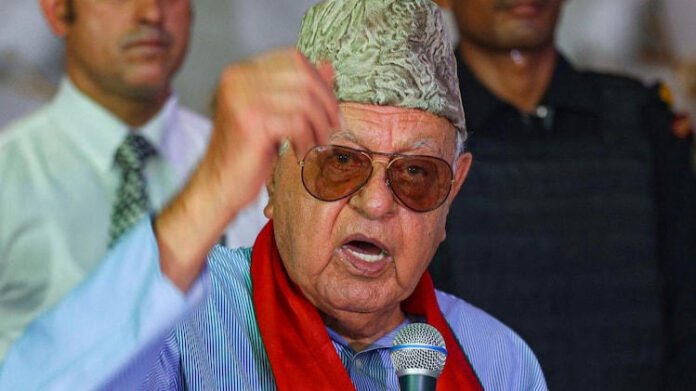Srinagar, Jammu & Kashmir – In the wake of yet another terror attack in Jammu & Kashmir (J&K), veteran Kashmiri leader and former Chief Minister, Farooq Abdullah, delivered a blunt message to Islamabad, reiterating India’s firm stance on the Kashmir issue. Addressing the nation, Abdullah strongly condemned the recent surge in cross-border terrorism and sent a clear and direct message to Pakistan: “Kashmir won’t become Pakistan, you tried for 75 years, but it’s not going to happen.”
The Context: A Longstanding Conflict
Kashmir has long been at the center of territorial disputes between India and Pakistan, both of which claim the region in full but control parts of it. Since 1947, the two nations have fought three wars over Kashmir, and while Pakistan has supported separatist movements and sponsored terrorist activities in the region, India has firmly maintained that Kashmir is an integral part of its territory. In recent years, the Indian government has moved decisively to reinforce this stance, especially after the abrogation of Article 370 in August 2019, which revoked the special status of Jammu & Kashmir.
Farooq Abdullah’s comments came in the aftermath of a terror attack in J&K, which was allegedly backed by Pakistan-based militant groups. The attack, which resulted in the deaths of several security personnel and civilians, reignited tensions in the region and put a spotlight on the unresolved issue of cross-border terrorism.
Abdullah’s Stern Rebuttal
Abdullah, the patriarch of the National Conference and a seasoned politician who has been at the forefront of Kashmir’s political landscape for decades, did not mince words. “Pakistan has tried everything possible to take Kashmir over the last 75 years, but they have failed miserably, and they will continue to fail. Kashmir is an integral part of India and will remain so,” he said while addressing a press conference.
His message reflected not only India’s position on Kashmir but also the frustration many in the region feel about Pakistan’s continuous attempts to destabilize the area through terrorism. Abdullah’s strong remarks were aimed at both the Pakistani government and the militant organizations it allegedly supports, sending a signal that India will not bow to intimidation or violence.
The Attack: A Grim Reminder
The terror attack that prompted Abdullah’s comments occurred in early October in a remote area of J&K. Heavily armed militants ambushed a convoy of security forces, resulting in the deaths of multiple soldiers and leaving several others injured. Civilians caught in the crossfire were also among the casualties.
According to initial reports, the attackers were suspected members of a Pakistan-based group, Jaish-e-Mohammed, which has been responsible for numerous terrorist activities in the region. Indian intelligence agencies have long maintained that groups like Jaish and Lashkar-e-Taiba are actively supported by Pakistan’s military and its intelligence agency, the ISI.
This attack is part of an ongoing pattern of violence in J&K, where militants frequently target Indian security forces and civilians. While India has made significant strides in improving security in the region, particularly since the abrogation of Article 370, such incidents underscore the persistent threat posed by cross-border terrorism.
Abdullah’s Criticism of the International Response
Farooq Abdullah also expressed disappointment with the global community’s response to terrorism in Kashmir, particularly what he described as the “selective outrage” over terrorist acts. He urged international bodies like the United Nations to take a stronger stand against Pakistan’s involvement in cross-border terrorism.
“The world must wake up to the fact that Pakistan is a breeding ground for terrorism,” Abdullah said. “While we are constantly asked to hold dialogues, what sort of dialogue can we have with a country that continues to send terrorists across the border to kill our people?”
His comments echoed those of many Indian political leaders who have called for more stringent international action against Pakistan for its role in sponsoring terrorism. Abdullah’s statement also highlighted India’s frustration with what it perceives as a lack of consistent pressure on Pakistan from global powers like the United States and the European Union.
A Message of Resilience
Despite his strong criticism of Pakistan, Abdullah struck a note of resilience and unity in his address. He emphasized that the people of Jammu & Kashmir, regardless of their political differences, stand united against terrorism and external interference. He lauded the security forces for their sacrifices and urged the central government to continue taking all necessary steps to protect the region.
“Kashmiris want peace, development, and a future for their children,” he said. “Terrorism only brings misery, and we will not let it destroy our land. We have been through worse, and we have emerged stronger.”
Farooq Abdullah’s forceful message to Pakistan after the recent terror attack in Jammu & Kashmir reflects India’s unwavering stance on the Kashmir issue. As the region continues to face the threat of cross-border terrorism, Abdullah’s words serve as both a condemnation of Pakistan’s actions and a call for resilience among Kashmiris. His speech not only underscores the determination of India to safeguard its territorial integrity but also highlights the pressing need for the global community to take a more decisive stand against state-sponsored terrorism in South Asia.

